Liza had just settled in for the evening. Her cat was curled up on her lap, purring softly while she scrolled through her phone. Then, out of nowhere, a little nip on her hand. She looked down, confused.
“Why does my cat bite me when everything seems fine?”
At American Paws Club, we get this question from cat parents all the time. So today, we’re sitting down with Liza and our expert vet, Dr. Mykhailo Ozmenchuk, to talk it through together.
Why Is My Cat Biting Me? It Happens Out of Nowhere. 🐱
Liza watched her cat settle into her lap, purring softly. Everything was calm. Then, without a sound, her cat nipped her hand.
“She was purring one second and bit me the next,” Liza said. “No warning. No growl. Just a quick bite. Why is my cat biting me when nothing seems wrong?”
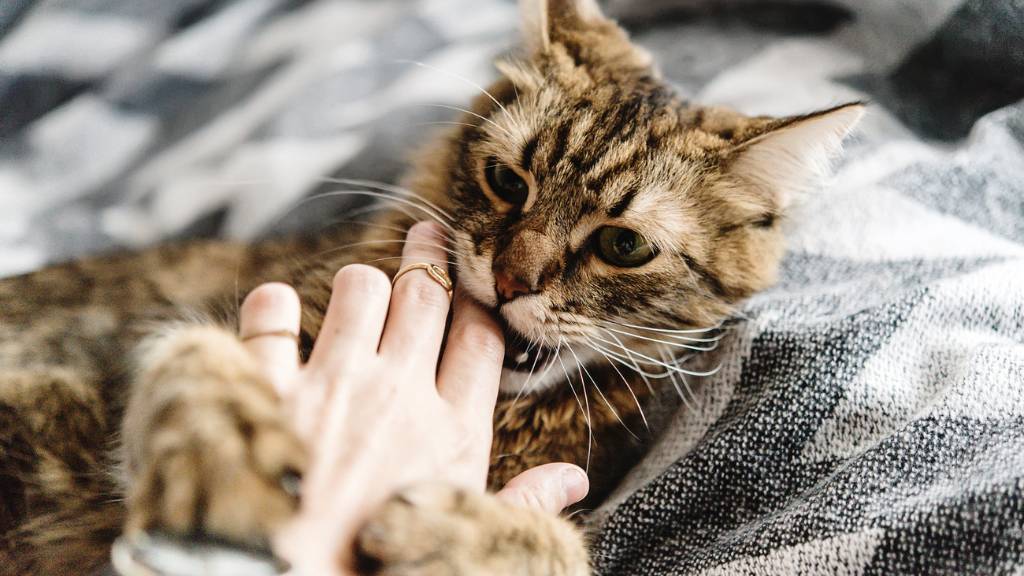
This is a question we hear often. Many cat parents tell us, “My cat bites me for no reason.” But most of the time, there is a reason—it just isn’t obvious at first.
Here are a few common triggers:
- Overstimulation during petting, especially near the tail or belly
- Redirected energy from something outside the window or another pet
- Change in routine or a new object or scent in the home
- Play behavior that lacks clear boundaries
- Subtle stress signals from things like loud sounds or unfamiliar guests
Learn what subtle tail twitching may mean in our guide on tail signals.
Even when things seem calm, your cat may be responding to something you didn’t notice.
We asked Dr. Mykhailo Ozmenchuk to explain more.
“Cats usually give clues before they bite,” he said. “Tail flicks, ear twitches, even a freeze in posture. These are their signals. If a cat bites you during a calm moment, they might be reacting to something small that set them off. It can be physical or emotional. And it often goes unnoticed until the bite happens.”
Learning these early signals can help you avoid surprise bites and better understand your cat’s moods.
Should I Worry About My Cat’s Gentle Nips? 🐈
Liza leaned in, a little more puzzled now.
“Sometimes she just reaches over and gives me this tiny, soft bite,” she said. “It doesn’t hurt, but I don’t know what it means. My cat softly bites me when we’re relaxed. Is it a sign of love or something else?”
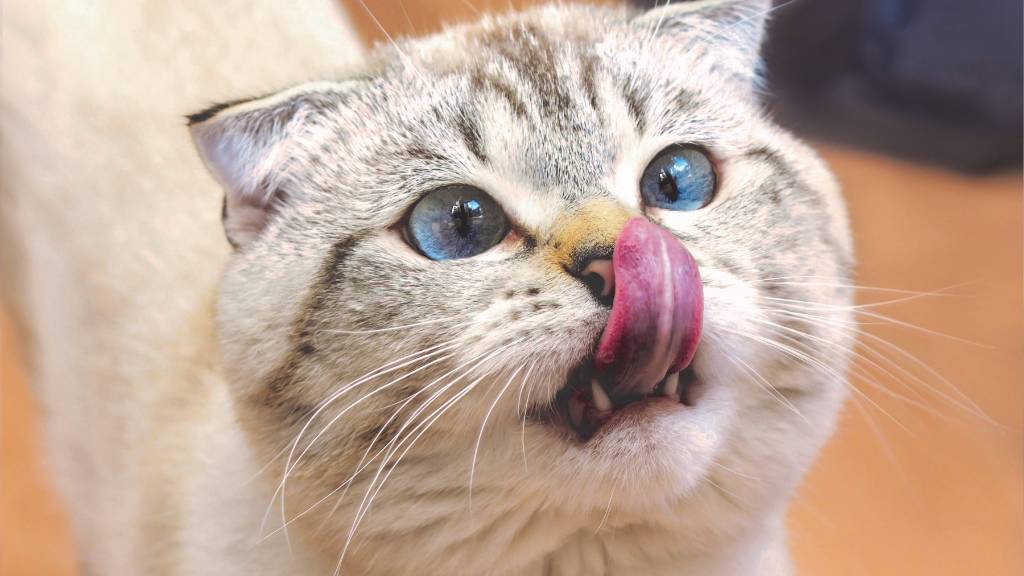
These soft nips can feel confusing, especially when everything seems calm. But they often have meaning.
Here’s what gentle bites might signal:
- Social grooming behavior your cat would use with another cat
- A quiet sign of trust during bonding time
- A way to ask for attention or re-engage with you
- A sign they are feeling close but need a small break from touch
Cats often use their mouths to communicate. A soft bite usually comes without signs of tension or fear. The body stays relaxed, and the eyes stay calm.
We spoke with Dr. Mykhailo Ozmenchuk to understand this behavior more clearly.
“A gentle bite is usually part of social bonding,” he said. “Cats groom each other and include soft nips in that process. If your cat softly bites you during a calm moment, it’s often normal. It only becomes a concern if the biting turns rough or starts to happen more often without a clear cause.”
These light bites are usually harmless. Knowing the difference between affection and discomfort helps you respond with more confidence.
My Cat’s Biting Is Getting Frequent. Why? ⋆🐾⋆
Liza sat back, a little more uneasy now.
“It’s not just once in a while,” she said. “My cat bites all the time. Sometimes it’s soft, sometimes it’s not. It’s getting hard to know what’s okay anymore.”
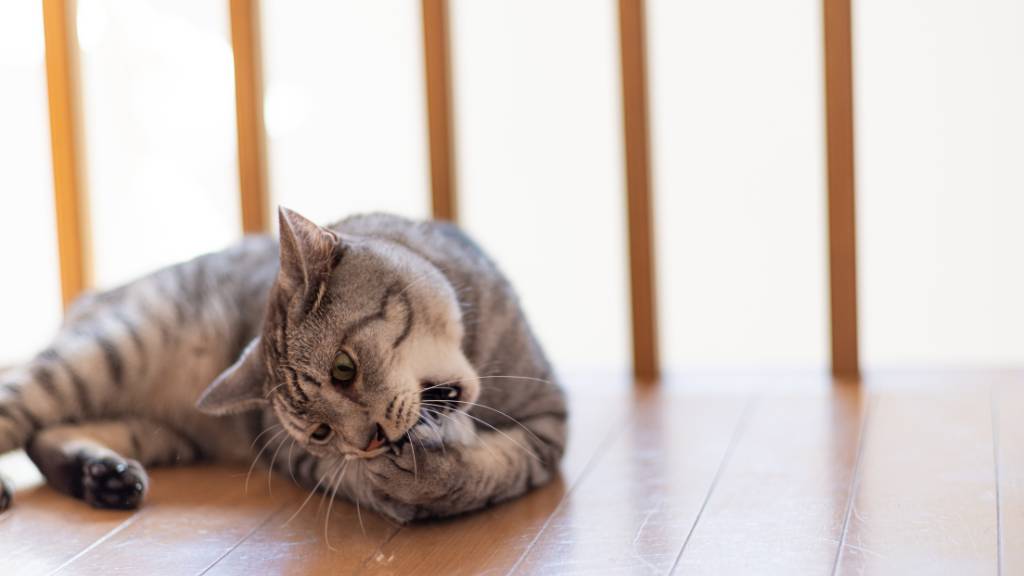
This kind of pattern is more common than people realize. When a cat keeps biting, even without clear triggers, it can wear on the bond between pet and parent.
We’ve seen this kind of behavior linked to a few different causes:
- Routine confusion or lack of structured playtime
- Built-up energy with no outlet
- Misread signals, where a cat thinks they’re setting boundaries but the human doesn’t respond
- Anxiety or stress tied to changes in their space
- Underlying health issues, especially pain or discomfort
Persistent cat biting is sometimes a cat’s way of trying to cope or ask for help in the only way they know how.
We asked Dr. Mykhailo Ozmenchuk when repeated biting might mean something more.
“When a cat shows a pattern of biting over time, it’s important to pay attention to timing, body language, and any changes in their environment or health,” he explained. “If biting happens during rest, or when there’s no clear trigger, it could point to hidden pain, overstimulation, or behavioral imbalance. A check-up can rule out physical causes before looking at behavioral ones.”
When biting becomes a regular part of your cat’s behavior, it’s not something to ignore. The sooner you understand the root, the easier it becomes to create calmer, safer routines together.
How Do I Stop My Cat From Biting? 😻
Liza looked worried now.
“I’ve tried ignoring it, saying no, even gently moving her away. Nothing works for long. How do I stop my cat from biting without making her upset?”
We always encourage gentle correction and clear communication. Harsh reactions often make biting worse or create fear. Cats need structure and calm, not punishment.
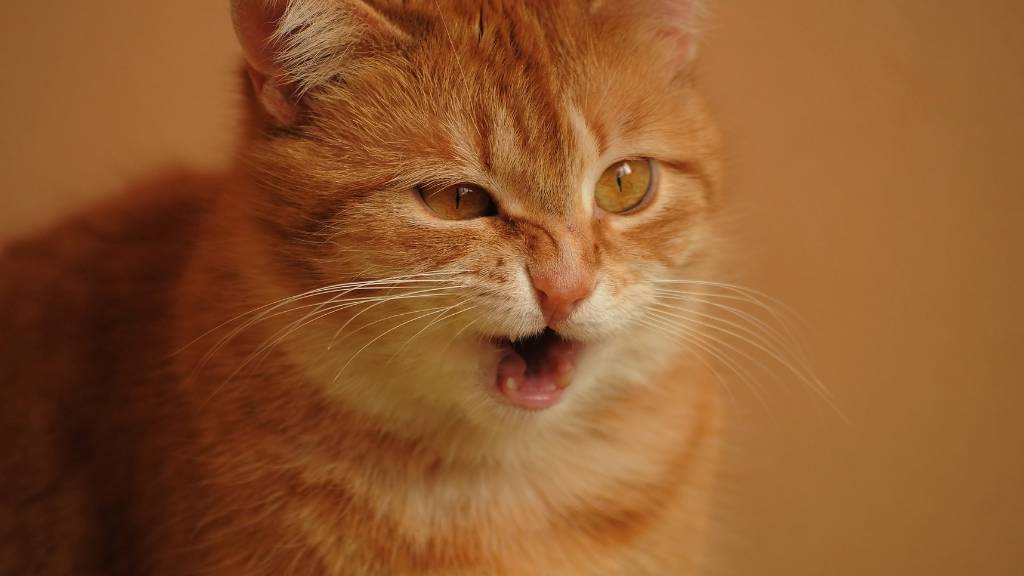
Here are a few ways to correct cat behavior gently while building trust, according to Dr. Mykhailo:
- Set consistent boundaries. If your cat bites during petting, stop the interaction immediately without speaking or making eye contact.
- Learn the signs. Pay close attention to tail swishing, ear twitching, or skin ripples. These often come right before a bite.
- Use redirection. Keep a stash of chew toys or textured pads within reach. A playtime toy subscription keeps the fun rolling in and gives your cat a better target than your hand.
- Avoid overstimulation. Some cats only enjoy short bursts of affection. Keep petting sessions brief and focused on areas they like. If you’re curious about what helps your cat relax, check out our insights on what cats typically enjoy.
- Reward calm behavior. Use treats, soft praise, or playtime to reinforce quiet, bite-free moments.
“If your cat’s biting suddenly increases or seems linked to specific areas of the body, it could be a sign of pain. “Dental issues, joint discomfort, or skin irritation may cause a cat to lash out when touched. If the biting is new or comes with changes in eating or grooming, scheduling an online veterinarian consultation can help rule out underlying health issues.”
How to stop a cat biting begins with understanding what your cat is trying to say. With calm redirection, patience, and awareness, you can guide your cat toward safer, softer behavior that strengthens your bond every day.
If you’re unsure, this piece on why cats don’t like being held is a helpful read.
Vet Tips on How to Correct Cat Biting 😺👨🏻⚕️
We circled back with Dr. Ozmenchuk for a few focused takeaways every cat parent should keep in mind when dealing with biting.
Watch for early cues. 🔎🤔
“If your cat’s tail starts flicking quickly, ears turn back, or their body goes still during petting, it’s time to pause,” Dr. Ozmenchuk explained. “These are early signs of overstimulation that often come before a bite.”
Keep redirecting tools nearby. 🧰
A small chew toy, soft wand, or textured pad can help your cat shift that energy somewhere safe. Some cats also respond well to calming sprays or gentle background noise, especially in high-energy households.
Know when to call your vet. 👨⚕️🐱
“If your cat bites more often, bites harder than usual, or reacts to being touched in the same spot every time, it might be linked to pain or stress,” he added. “Behavioral changes paired with grooming shifts, hiding, or appetite loss should always be checked.”
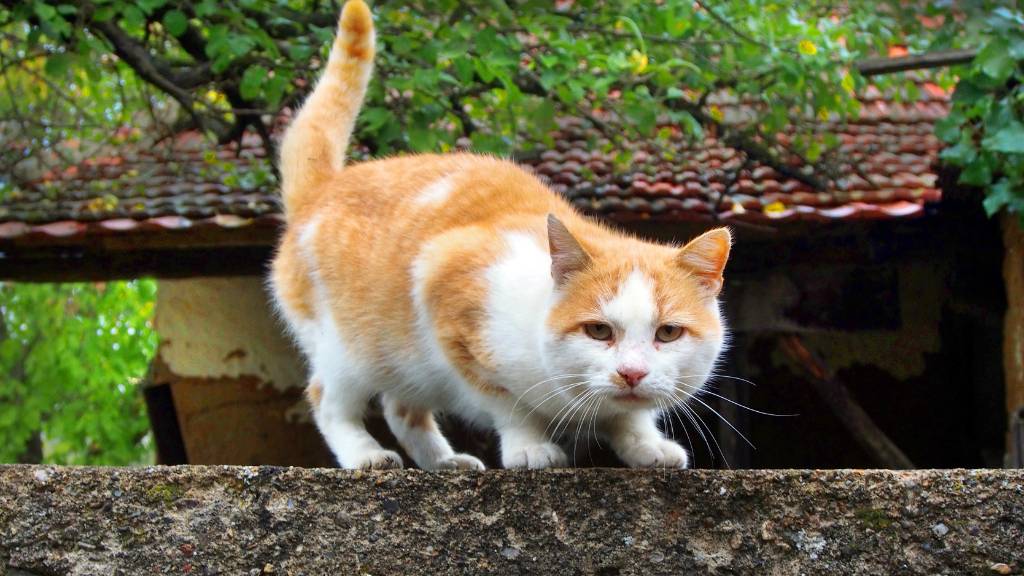
If your cat came from a breeder, knowing their early care and socialization history can help explain some behaviors. Our breeder verification tool is one way to learn more.
Wrapping Up: A Word to Cat Parents 🤩😸
Liza reached out with a question we hear often. Like many cat parents, she wanted to understand the small signals her cat was sending. A bite can seem sudden, but there is always something behind it.
We’ve walked through soft nips, repeated patterns, and sudden changes in behavior. These moments are how cats set boundaries. Learning to spot those early signs can prevent tension and build trust.
What matters most is how you respond. A calm hand, a quiet pause, or gentle redirection can shift the energy. If anything seems off, a check-in with your vet is always a good step.
At American Paws Club, we support cat parents like Liza who want to feel more confident and connected. Our resources are here to guide you through every phase, from biting concerns to building stronger daily routines.
Starting fresh with a kitten? Gentle behavior training works best early on. If you’re welcoming a new feline soon, explore our trusted kittens for sale listings for a healthy start.
Visit American Paws Club for trusted advice, vet insights, and a caring community. Our team is here when you need to reach out or ask a question.

FAQs
1. Why does my cat bite me for no reason?
What seems random often isn’t. Your cat might be reacting to something small—like overstimulation, a shift in your mood, or a sound outside. Cats show boundaries in subtle ways. Learning their signals early can help prevent sudden bites.
2. Are gentle cat bites something to worry about?
In most cases, no. Soft bites often happen during quiet bonding moments. They can mimic grooming or signal that your cat needs a short break. If the body stays relaxed and the bite stays light, it’s usually harmless.
3. How do I stop my cat from biting me during calm moments?
Watch for changes in body language. Tail flicks or a pause in movement can show your cat is overstimulated. End the interaction gently and redirect their energy with toys or short play. Reward calm behavior when it happens.
4. When should I see a vet about my cat’s biting?
If your cat bites more often or reacts when touched in the same place, it could be a sign of pain. Appetite shifts, hiding, or grooming changes are also signs to watch for. A vet visit can help rule out any health concerns.


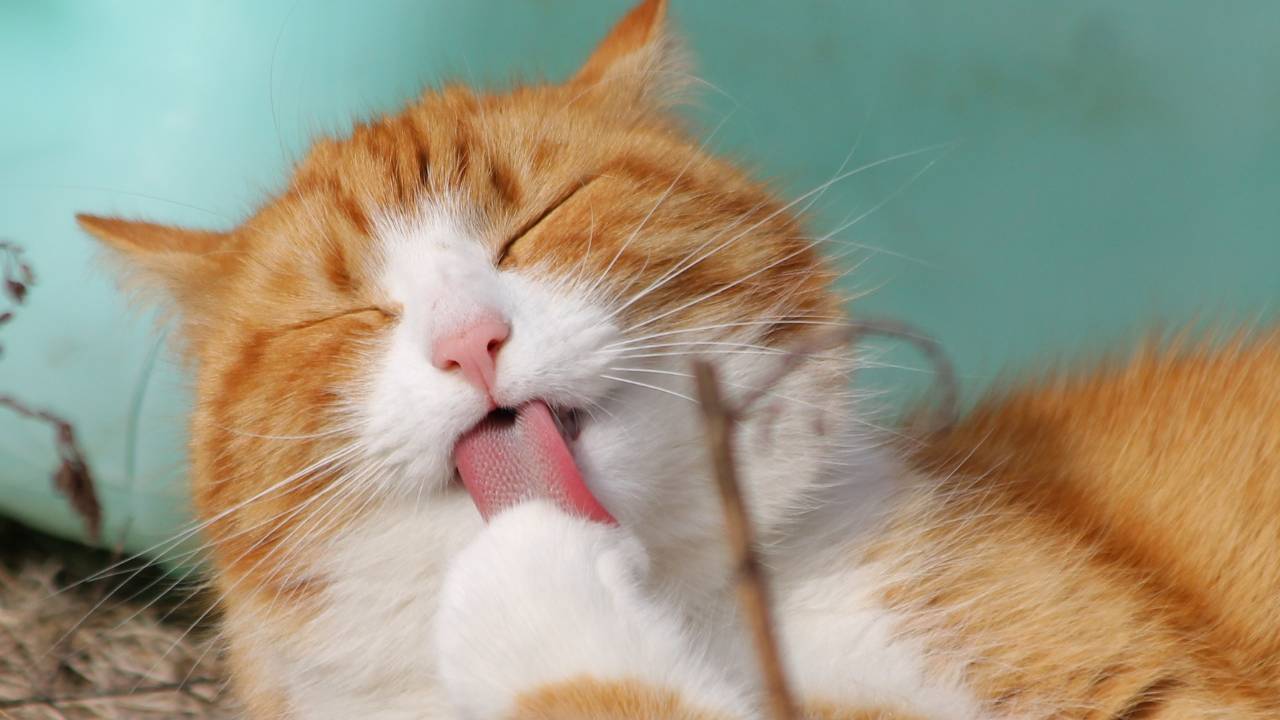



0 Comments